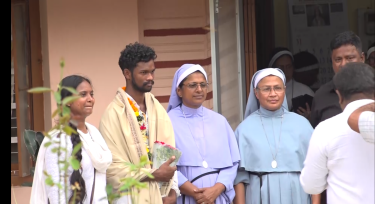
Five days after two Catholic nuns walked free from Durg Central Jail, political pressure is mounting for the closure of what critics describe as a fabricated case built on religious prejudice and communal targeting.
Sisters Vandana Francis and Preeti Mary of the Assisi Sisters of Mary Immaculate, along with Sukhman Mandavi from Chhattisgarh’s Narayanpur district, were released on August 2 after a National Investigation Agency court granted them bail, ending nine days of custody that had sparked nationwide protests and exposed deep political divisions over religious freedom in India.
The two Catholic nuns from Kerala and the tribal man were arrested at Durg Railway Station on July 25 following allegations by Bajrang Dal activists that they were trafficking three tribal women for forced religious conversion.
The NIA court in Bilaspur delivered a scathing assessment of the case, stating the FIR was “primarily based on a mere apprehension and suspicion of commission of an offence by the accused persons.” The court noted that parents of the three alleged victims had filed affidavits confirming their daughters were not “allured or forced or coerced” for religious conversion or trafficking.
Significantly, the court observed that two of the three women had stated in police testimony under Section 180 of the Bharatiya Nyaya Sanhita that “they have been followers of Christianity since childhood,” undermining conversion allegations.
The controversy began when a platform ticket examiner questioned the group’s documentation, prompting Bajrang Dal members to arrive at the scene after reportedly receiving a call from railway staff. Ravi Nigam, a Bajrang Dal member, filed the initial complaint alleging the nuns were taking the women to Agra for conversion.
However, multiple sources, including families of the three tribal women, have confirmed they were already Christians. The initial FIR notably contained only trafficking charges under Section 143, with religious conversion charges under the Chhattisgarh Freedom of Religion Act added later.
The case exposed unprecedented political unity across party lines in Kerala, where both the ruling Left Democratic Front and opposition United Democratic Front condemned the arrests. Remarkably, the BJP’s Kerala unit distanced itself from the action, with state president Rajeev Chandrasekhar characterising the situation as a “profound misunderstanding.”
“We have immediately reached out to the government of Chhattisgarh and clarified that these are nuns who were accompanying three adult women with the consent of their families for jobs. Therefore, there was no issue of trafficking, nor was there an issue of any conversion,” Chandrasekhar told media.
The Kerala BJP leader revealed that Prime Minister Narendra Modi and Union Home Minister Amit Shah had assured him the bail would not be opposed, noting the state government kept that promise.
In stark contrast, Chhattisgarh Chief Minister Vishnu Deo Sai had defended the arrests, posting on social media that the case involved “human trafficking under the guise of conversion by luring.” His public pronouncement drew criticism from legal experts who questioned prejudging an ongoing investigation.
The three young women at the centre of the allegations have since approached police in Narayanpur district, seeking to register an FIR against Bajrang Dal members for allegedly assaulting them and forcing false statements against the nuns. One woman, Kamleshwari Pradhan, publicly alleged that activists coerced her testimony.
Central to these allegations is Jyoti Sharma, who describes herself as a “Hindutvawadi” from Durga Vahini Matrushakti. A viral video emerged showing Sharma threatening the nuns inside the police station, saying: “If you don’t want to speak, I will smash your face, I’m warning you.” When contacted by media, Sharma denied physically assaulting anyone but justified her actions to another outlet, stating: “I don’t hit everyone. I just hit people who convert Hindu girls to Christianity.”
Arun Pannalal, President of the Chhattisgarh Christian Forum, alleged this was not Sharma’s first offense against Christians. He described her as a repeat offender with multiple FIRs filed against her, yet she remains unarrested as police have told courts she is absconding. Pannalal questioned how someone supposedly in hiding could enter police stations at will to threaten detained individuals.
“It is the duty of the police to provide protection to anyone that they have arrested as per law,” Pannalal told Christian Today, highlighting what he described as institutional failure to safeguard those in custody.
Speaking to Christian Today, Kamleshwari Pradhan said: “We were badly beaten up by Jyoti Sharma who kept slapping us and even threatened with rape and so we had no option but to sign the statement that the Bajrang Dal had prepared.”
CPI(M) leader Brinda Karat, who visited the imprisoned nuns, condemned the case as “manufactured” and reported concerning jail conditions. Both nuns, in their mid-fifties and suffering from chronic arthritis, were forced to sleep on cold floors while running temperatures.
Congress general secretary K.C. Venugopal has written to Union Home Minister Amit Shah and Chhattisgarh Chief Minister Vishnu Deo Sai, seeking closure of the cases and action against Bajrang Dal members. “Their arrest represents a gross misuse of state power, driven not by law but by communal prejudice and political malice,” Venugopal wrote.
The arrests prompted protests in Parliament, with Priyanka Gandhi leading demonstrations and describing the incident as “mob justice and communal targeting.”
Mother Superior Isabel Francis of the Assisi Sisters told the media: “Never have we ever faced such a charge of forceful religious conversion in our history.” She revealed the congregation began 75 years ago as an intervention to heal leprosy before expanding into general medicine and education.
The bail conditions require the nuns to surrender their passports, report to police every two weeks, and refrain from media interviews. Each provided a bond of Rs 50,000 with two sureties of the same amount.
The controversy briefly escalated when Chhattisgarh BJP posted a cartoon on social media depicting Congress leaders bowing to nuns and supporting “human trafficking and religious conversions.” The post was quickly deleted following backlash, with party officials saying it was “not the right subject.”
Major Archbishop Raphael Thattil of the Syro-Malabar Church expressed relief at the bail while emphasising the fight for justice continues. “The immediate next step must be the quashing of the charge sheet, which is both malicious and factually baseless,” he told media.




